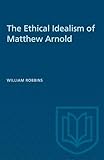The Ethical Idealism of Matthew Arnold / William Robbins.
Material type: TextSeries: HeritagePublisher: Toronto : University of Toronto Press, [1959]Copyright date: ©1959Description: 1 online resource (272 p.)Content type:
TextSeries: HeritagePublisher: Toronto : University of Toronto Press, [1959]Copyright date: ©1959Description: 1 online resource (272 p.)Content type: - 9781487585136
- 9781487575113
- 828 22/eng/20230216
- online - DeGruyter
| Item type | Current library | Call number | URL | Status | Notes | Barcode | |
|---|---|---|---|---|---|---|---|
 eBook
eBook
|
Biblioteca "Angelicum" Pont. Univ. S.Tommaso d'Aquino Nuvola online | online - DeGruyter (Browse shelf(Opens below)) | Online access | Not for loan (Accesso limitato) | Accesso per gli utenti autorizzati / Access for authorized users | (dgr)9781487575113 |
restricted access online access with authorization star
http://purl.org/coar/access_right/c_16ec
The 1860's and 1870's in England were times of intense excitement in scientific and religious thought. On the one hand the work of Darwin, Huxley and others produced a new and sometimes shocking liberalism: on the other, the drift towards Rome (exemplified in the life of Cardinal Newman) led to an ever more rigid dogmatism. Matthew Arnold was one of those who attempted a reconciliation between the forces of scientific investigation and those of ecclesiastical reaction. The Bible, he suggested, should be regarded literature, not as literal fact or as unscientific nonsense; biblical criticism should be undertaken in a spirit of enquiry both rational and imaginative. He also hoped for a transformed and genuinely comprehensive Church, 'opening itself to the light and air', which would fully satisfy man's moral needs. Professor Robbins traces the development of Arnold's religious and philosophical thought, and shows how his mission of reconciliation met with hostility from both sides, but none the less made an invaluable contribution to the debates of the period, and laid the foundations of a humanistic, ethical idealism which also has relevance to the difficulties of our own time. The problem of whether morals can be dissociated from religious sanctions is found to be the heart of the matter, and is surveyed from all points of view. In his final chapter Professor Robbins examines the various modern approaches to this question, made in the name of religion, science, or humanism, and argues that Arnold's attempt at synthesis may be found to have a reasonableness lacking in apologists of many persuasions, and that 'the sanity and catholicity of attitudes like his are desperately needed.' Professor Robbins has brought all the apparatus of scholarship to bear upon his subject, and the serious student of literature, philosophy, or religion will find his study fully documented and illustrated by unusually wide reading. But the general reader will also be encouraged to find a subject of great interest treated straightforwardly in a style uncluttered with specialist jargon. For all those who are interested in the interplay of ideas between science, religion, and humanism, this is an important book.
Mode of access: Internet via World Wide Web.
In English.
Description based on online resource; title from PDF title page (publisher's Web site, viewed 01. Nov 2023)


